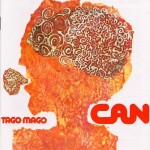Oneida : Romance

Oneida sound relatively unchanged on Romance, their first non-collaborative record of industrialized krautrock after a six-year hiatus. The band’s particular brand of slow-developing and often minimalist repetition-heavy krautrock requires less a change of formula and more a change of initial starting conditions. If Radiohead is the pop locus of the telos of krautrock, thrusting these sonic ideas into a broader mainstream stage, Oneida is a darkened counter, closer to the clattering and occasionally more abrasive end of Can and Neu!’s seminal work.
Vocals feels as improvised as instrumental lines, less married alchemically to a bed of sound with a unified direction and more sung instinctively into the microphones as a response to the sound. They manage with this to break the sometimes overly cerebral nature this music can take on for some that can’t quite immerse themselves into the throbbing perpetual groove. It’s an effective gesture and one not always handled well by the musician-first nature of a lot of krautrock and groove/improvisation oriented music like this, which can sometimes come off as hackneyed when vocal performances are either too integrated or too jarring and disconnected from the source sonic material.
The highlights of the record come at the close of each half, first with the 10-minute barnburner “Lay of the Land” and second with the album finale, the 18-minute and relatively rich and luxurious “Shepherd’s Axe.” The group remains tightly focused elsewhere, rarely cresting far beyond the five-minute mark, keeping an often wooly genre format trimmed to only the most compelling parts. The average brevity of these tracks keeps the tunes from wandering too far into the eventless hinterlands a lot of long-form music, especially improv-developed music, can sometimes find themselves wading in. For the most part, these tracks are eventful and justify themselves, with clear melodic, rhythmic and sonic ideas, departing when the point is adequately made. It’s because of the well-crafted nature of these tracks that the longer explorations are able to shine so brightly. The record doesn’t feel bogged down by emotionally draining if sonically satisfying slow-blossoming krautrock workouts. The two deep-dives are earned and come as a relief.
This leads to the primary and frankly sole serious issue of the record: its tremendous length. While these lengthy tracks come at good structural moments in the record, not being placed too early to drain the emotional fortitude of the listener, the sheer gauntlet of shorter tracks beforehand does that job instead. The album is over 70 minutes long and by the end of the tracklist, that length is certainly felt. This is frustrating precisely because, goofy punkish track “Cockfight” aside, none of the tracks feel bad or necessarily worthy of exclusion. But with music so focused on repetition and development, it’s hard to keep track of 11 tracks spread over 70 minutes in one solid push. This is one of the reasons records like this tend to be either quite brief and focus on very short pieces of music, little fragments outlining a concept before departing, or have a few very lengthy tracks. Following one piece developing over the course of an hour is relatively easier than this, and the sonic fatigue starts weighing down otherwise good, worthwhile songs. A better format perhaps would have been a double-disc record, some kind of tangible break after the first lengthy track. Really, anything to lessen the psychic load harming such satisfying, cerebral, fun, human experimental rock.
Similar Albums:
 Liars – WIXIW
Liars – WIXIW
 The Skull Defekts – The Skull Defekts
The Skull Defekts – The Skull Defekts
 Can – Tago Mago
Can – Tago Mago
Langdon Hickman is listening to progressive rock and death metal. He currently resides in Virginia with his partner and their two pets.

